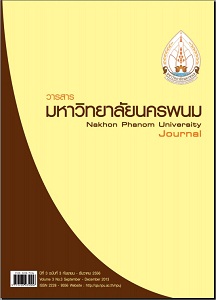การพัฒนาการส่งออกสินค้าทางอากาศประเภทผักผลไม้ จากประเทศไทยไปสู่สหภาพยุโรป
Main Article Content
Abstract
การวิจัยฉบับนี้มีวัตถุประสงค์เพื่อ 1) ศึกษาปัจจัยที่ส่งผลต่อการผลิตและการส่งออกสินค้าทางอากาศประเภทผักผลไม้จาก ประเทศไทยไปสู่ประเทศสมาชิกในสหภาพยุโรป 2) นอกจากนี้ยังมุ่งเน้นในการบ่งชี้ระดับความสำคัญของปัจจัยต่างๆ 3) ปัญหา และอุปสรรค และแนะนำแนวทางที่นำไปสู่การพัฒนาการส่งออกสินค้าประเภทดังกล่าวได้ นอกจากนี้ยังศึกษาความแตกต่างของระดับ ความสำคัญของปัจจัยต่างๆ เปรียบเทียบกันระหว่างบริษัทผู้ส่งออกสินค้าที่แตกต่างกันไป แบบสอบถามได้แจกให้แก่บริษัทผู้ส่งออก สินค้า จำนวน 32 บริษัท ซึ่งเป็นบริษัทที่ส่งออกสินค้าประเภทผักและผลไม้จากประเทศไทยไปสู่สหภาพยุโรป สถิติที่ใช้ในการวิเคราะห์ ข้อมูล ได้แก่ ความถี่ ค่าร้อยละ ค่าเฉลี่ย และส่วนเบี่ยงเบนมาตรฐาน และการวิเคราะห์ข้อมูลแบบอ้างอิงชั้นสูง ได้แก่ F-test ผลการวิจัยแสดงให้เห็นว่าปัจจัยที่บริษัทผู้ส่งออกเชื่อว่าเป็นปัจจัยที่สำคัญมากที่สุด ได้แก่ การขนส่งสินค้าทางอากาศ ตามด้วยอุณหภูมิ การเก็บรักษาสินค้า กฎเกณฑ์ในการส่งออก ระยะเวลาในการขนส่งหรือการส่งมอบสินค้า ราคาของสินค้า ปัจจัยด้านบรรจุภัณฑ์ และ การตรวจสอบด่านกักกันพืชตามลำดับ จากการทดสอบสมมติฐานพบว่าบริษัทที่มีจำนวนตลาดเป้าหมายที่ส่งออกแตกต่างกัน ให้ระดับ ความสำคัญแตกต่างกันในปัจจัยต่างๆ โดยที่พบความแตกต่างมากที่สุด ได้แก่ ปัจจัยการบริการของ สายการบิน กฎเกณฑ์ในการส่งออก อุณหภูมิการเก็บรักษาสินค้า และการตรวจสอบด่านกักกันพืช
The objectives of this study were to investigate factors influencing production and exportation of a perishables cargo by air from Thailand to the countries that are members of the European Union. It also aimed at identifying a significant level of those factors, finding out problems and obstacles and suggesting guidelines leading to the development of exporting the aforementioned type of cargo. Additionally, a difference of the significant levels of each factor was compared among different enterprises. The copies of a questionnaire were distributed to 32 export enterprises which exported perishable goods to the countries that were members of the European Union. Statistics used to analyze data were frequency, percentage, mean, standard deviation and F-test. The findings revealed that the factor that the export enterprises believed to be the most important was air cargo transport, followed by temperature for goods storage, export rules and regulations, duration of transporting and delivering goods, cargo price, packaging, and inspection from the plant checkpoint respectively. From hypothesis testing, it revealed that the enterprises that had a different number of target markets for exportation gave a different level of importance for each of the different factors. The most significant factors found different among the enterprises were those of airlines’ service, export rules and regulations, temperature for goods storage and inspection from the plant checkpoint.


